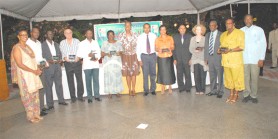– Says Jamaican Olympic silver medallist Grace Jackson at GOA Awards Ceremony
By Marlon Munroe
Olympic 200m silver medalist Grace Jackson could not have emphasized the point more: “Guyana is time for change; just do it,” as she underscored the necessity for athletes to have what she called “intrinsic motivation.”

Jamaica’s Jackson was at the time delivering the feature address at the Guyana Olympic Association’s (GOA) awards ceremony at the Georgetown Club on Friday evening. “Another thing an athlete must have is intrinsic motivation; it must come from within. The coaches who are here tonight – you go everyday to the training tracks and you can give them all the workouts in the world if they do not want to do it there is very little you can do; they have to be intrinsically motivated to do what they have to do,” Jackson maintained.
She also noted that a plot of land has already been allocated for the construction here of a synthetic athletics track.
Over the years officials and athletes have lamented the need for a tartan surface since this is what athletes have to compete on at international meets. Specialists also have voiced their concern over Guyana not having an all-weather track which ultimately puts our athletes at a serious disadvantage against their overseas competitors.
Jackson, who was also awarded the Order of Distinction in Jamaica, asked the gathering, including Sport Minister Dr. Frank Anthony, to consider two questions as they relate to Guyana becoming stronger in sports. She asked, “What are the threads that keep you together as a nation and can those threads be considered similar to the one that make up a quilt?’
She pointed out that Jamaica has identified music and sports as the major threads which have been interwoven to make a covering that has brought the country worldwide recognition. The country today is one of the superpowers in athletics with sprint megastar Usain Bolt leading the way.
In her address she told guests that she believes that four factors are responsible for the success of Jamaica in athletics. She identified them as (1) the recognition of the country’s proud athletics tradition, (2) desire, (3) structure and (4) the will of the athletes to be successful.
She noted that the tradition started at the school level and this has given rise to a heightened awareness of what was needed for the country to succeed in athletics. She said that this tradition was started over 100 years ago and ever since that structure has been working “like clockwork since administrators come and go.”
Most Guyanese athletes, like the Jamaicans, have not grown up in privileged situations and therefore track & field was their way out of poverty. She said the desire to put food on the table and to extricate themselves from the squalor of poverty were the things that drove them to work hard and succeed.
However, she was sure to point out that the athletes could not have made it on their own, without the support of a decent academic background. Jackson spoke directly to the young athletes when she said that they must have a vision and it is important that they do what is required of them to succeed. She said when people wonder why Jamaicans are successful she revealed last night that it was because the country was able to capture a number of these factors to get the country where it wanted to go.
“Those I think are the framework that has led to us having successful sports delivery in Jamaica. We did not sacrifice academics for sports or sports for academics, instead we used one to feed on the other and created a balance.
“We learnt and are still learning time management to get the best out of what we do. We had a large scale migration of our sports people to North America from the 1960s-1990s but there has been a turnaround as we realized that as we sailed away offshore what we sailed for overseas was very much at home; things just had to be done differently.”



